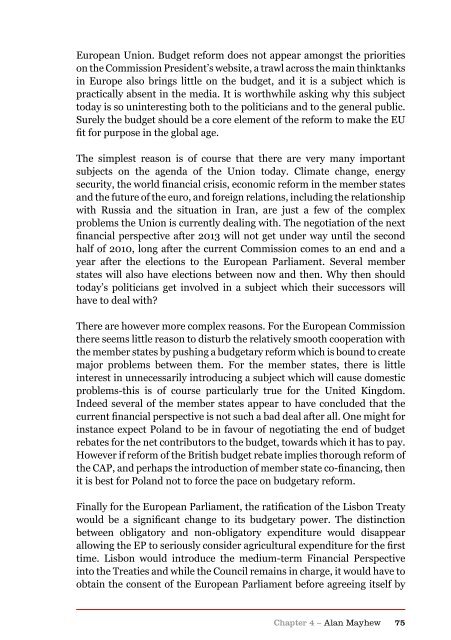Authors Iain Begg | Gabriel Glöckler | Anke Hassel ... - The Europaeum
Authors Iain Begg | Gabriel Glöckler | Anke Hassel ... - The Europaeum
Authors Iain Begg | Gabriel Glöckler | Anke Hassel ... - The Europaeum
Create successful ePaper yourself
Turn your PDF publications into a flip-book with our unique Google optimized e-Paper software.
European Union. Budget reform does not appear amongst the priorities<br />
on the Commission President’s website, a trawl across the main thinktanks<br />
in Europe also brings little on the budget, and it is a subject which is<br />
practically absent in the media. It is worthwhile asking why this subject<br />
today is so uninteresting both to the politicians and to the general public.<br />
Surely the budget should be a core element of the reform to make the EU<br />
fit for purpose in the global age.<br />
<strong>The</strong> simplest reason is of course that there are very many important<br />
subjects on the agenda of the Union today. Climate change, energy<br />
security, the world financial crisis, economic reform in the member states<br />
and the future of the euro, and foreign relations, including the relationship<br />
with Russia and the situation in Iran, are just a few of the complex<br />
problems the Union is currently dealing with. <strong>The</strong> negotiation of the next<br />
financial perspective after 2013 will not get under way until the second<br />
half of 2010, long after the current Commission comes to an end and a<br />
year after the elections to the European Parliament. Several member<br />
states will also have elections between now and then. Why then should<br />
today’s politicians get involved in a subject which their successors will<br />
have to deal with?<br />
<strong>The</strong>re are however more complex reasons. For the European Commission<br />
there seems little reason to disturb the relatively smooth cooperation with<br />
the member states by pushing a budgetary reform which is bound to create<br />
major problems between them. For the member states, there is little<br />
interest in unnecessarily introducing a subject which will cause domestic<br />
problems-this is of course particularly true for the United Kingdom.<br />
Indeed several of the member states appear to have concluded that the<br />
current financial perspective is not such a bad deal after all. One might for<br />
instance expect Poland to be in favour of negotiating the end of budget<br />
rebates for the net contributors to the budget, towards which it has to pay.<br />
However if reform of the British budget rebate implies thorough reform of<br />
the CAP, and perhaps the introduction of member state co-financing, then<br />
it is best for Poland not to force the pace on budgetary reform.<br />
Finally for the European Parliament, the ratification of the Lisbon Treaty<br />
would be a significant change to its budgetary power. <strong>The</strong> distinction<br />
between obligatory and non-obligatory expenditure would disappear<br />
allowing the EP to seriously consider agricultural expenditure for the first<br />
time. Lisbon would introduce the medium-term Financial Perspective<br />
into the Treaties and while the Council remains in charge, it would have to<br />
obtain the consent of the European Parliament before agreeing itself by<br />
Chapter 4 – Alan Mayhew 75

















